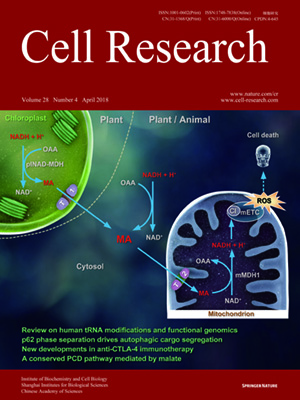
Volume 28, No 4, Apr 2018
ISSN: 1001-0602
EISSN: 1748-7838 2018
impact factor 17.848*
(Clarivate Analytics, 2019)
Volume 28 Issue 4, April 2018: 416-432 | Open Access
ORIGINAL ARTICLES
A reappraisal of CTLA-4 checkpoint blockade in cancer immunotherapy
Xuexiang Du 1, Fei Tang 1, Mingyue Liu 1, Juanjuan Su 1, Yan Zhang 1, Wei Wu 1, Martin Devenport 2, Christopher A Lazarski 1, Peng Zhang 1,Xu Wang 1, Peiying Ye 1, Changyu Wang 3, Eugene Hwang 1, Tinghui Zhu 4, Ting Xu 4, Pan Zheng 1,2 and Yang Liu 1,2
1 Center for Cancer and Immunology Research, Children’s Research Institute, Children’s National Health System, Washington, DC 20010, USA; 2 OncoImmune, Inc., Rockville, MD 20852, USA; 3 Immutics, Inc., Sunnyvale, CA 94085, USA and 4 Alphamab, Inc., Suzhou, Jiangsu 215125, China
Correspondence: Pan Zheng (pzheng@oncoimmune.com) or Yang Liu (yangl@oncoimmune.com)
It is assumed that anti-CTLA-4 antibodies cause tumor rejection by blocking negative signaling from B7-CTLA-4 interactions. Surprisingly, at concentrations considerably higher than plasma levels achieved by clinically effective dosing, the anti-CTLA-4 antibody Ipilimumab blocks neither B7 trans-endocytosis by CTLA-4 nor CTLA-4 binding to immobilized or cell-associated B7. Consequently, Ipilimumab does not increase B7 on dendritic cells (DCs) from either CTLA4 gene humanized (Ctla4h/h) or human CD34+ stem cell-reconstituted NSG™ mice. In Ctla4h/m mice expressing both human and mouse CTLA4 genes, anti-CTLA-4 antibodies that bind to human but not mouse CTLA-4 efficiently induce Treg depletion and Fc receptor-dependent tumor rejection. The blocking antibody L3D10 is comparable to the non-blocking Ipilimumab in causing tumor rejection. Remarkably, L3D10 progenies that lose blocking activity during humanization remain fully competent in inducing Treg depletion and tumor rejection. Anti-B7 antibodies that effectively block CD4 T cell activation and de novo CD8 T cell priming in lymphoid organs do not negatively affect the immunotherapeutic effect of Ipilimumab. Thus, clinically effective anti-CTLA-4 mAb causes tumor rejection by mechanisms that are independent of checkpoint blockade but dependent on the host Fc receptor. Our data call for a reappraisal of the CTLA-4 checkpoint blockade hypothesis and provide new insights for the next generation of safe and effective anti-CTLA-4 mAbs.
10.1038/s41422-018-0011-0
FULL TEXT | PDF
Browse 1782


